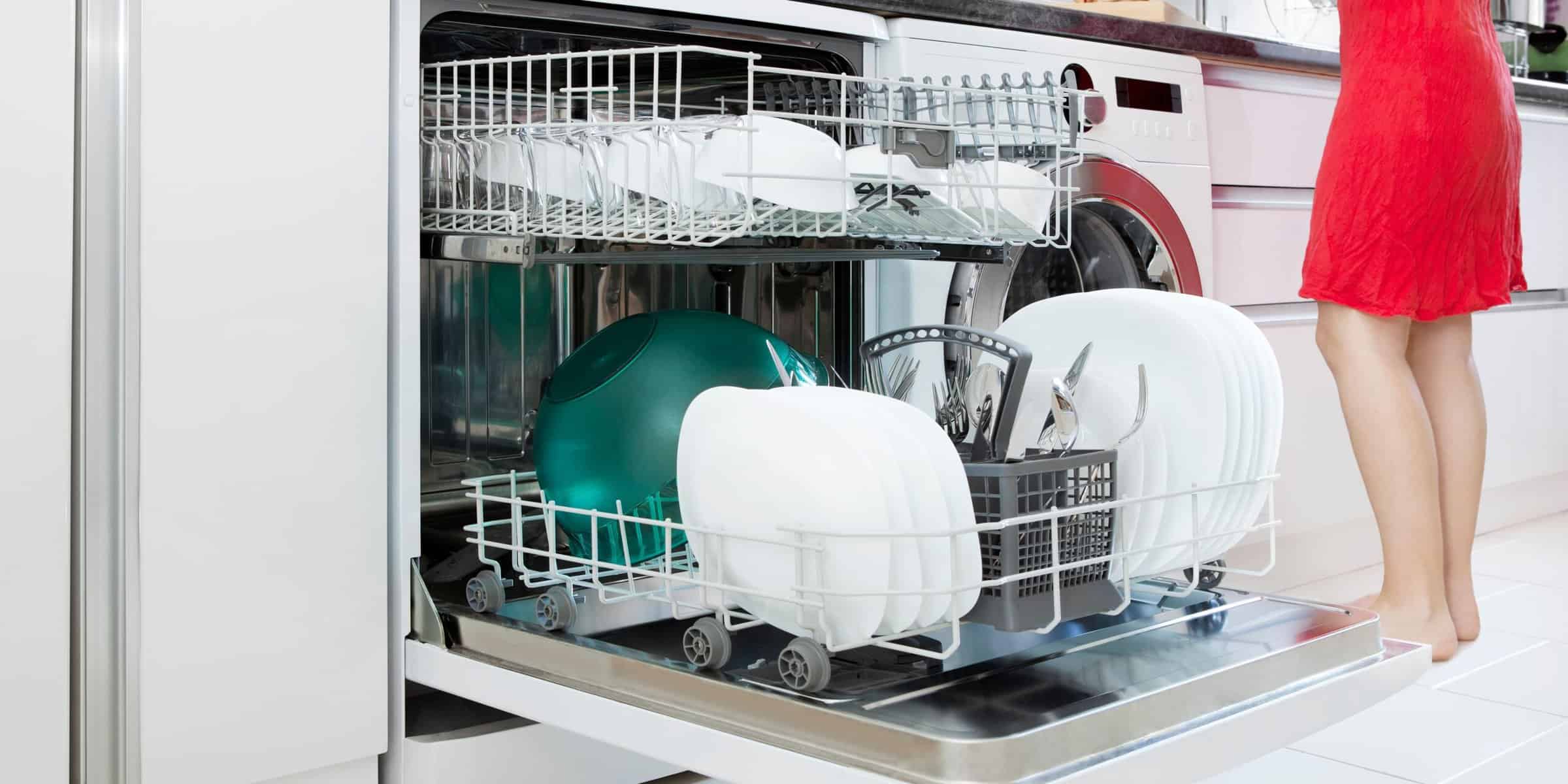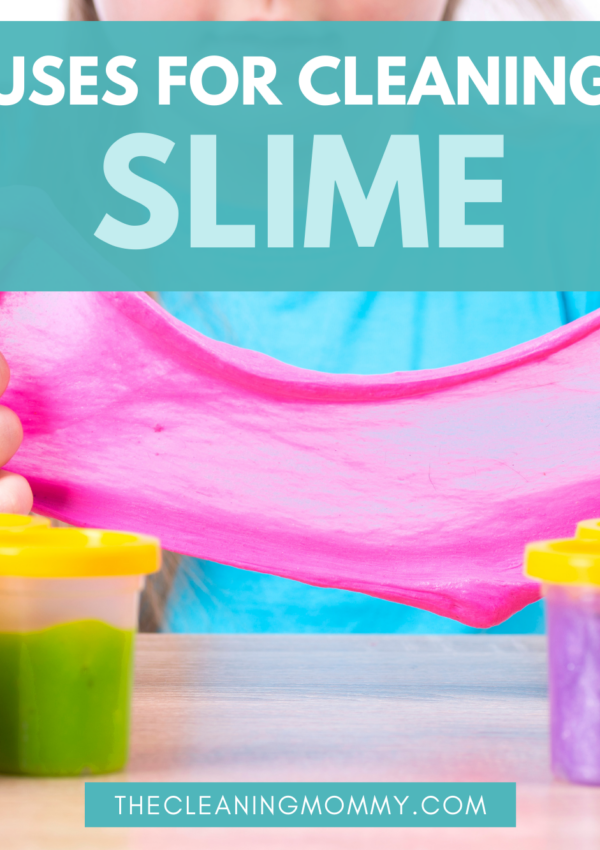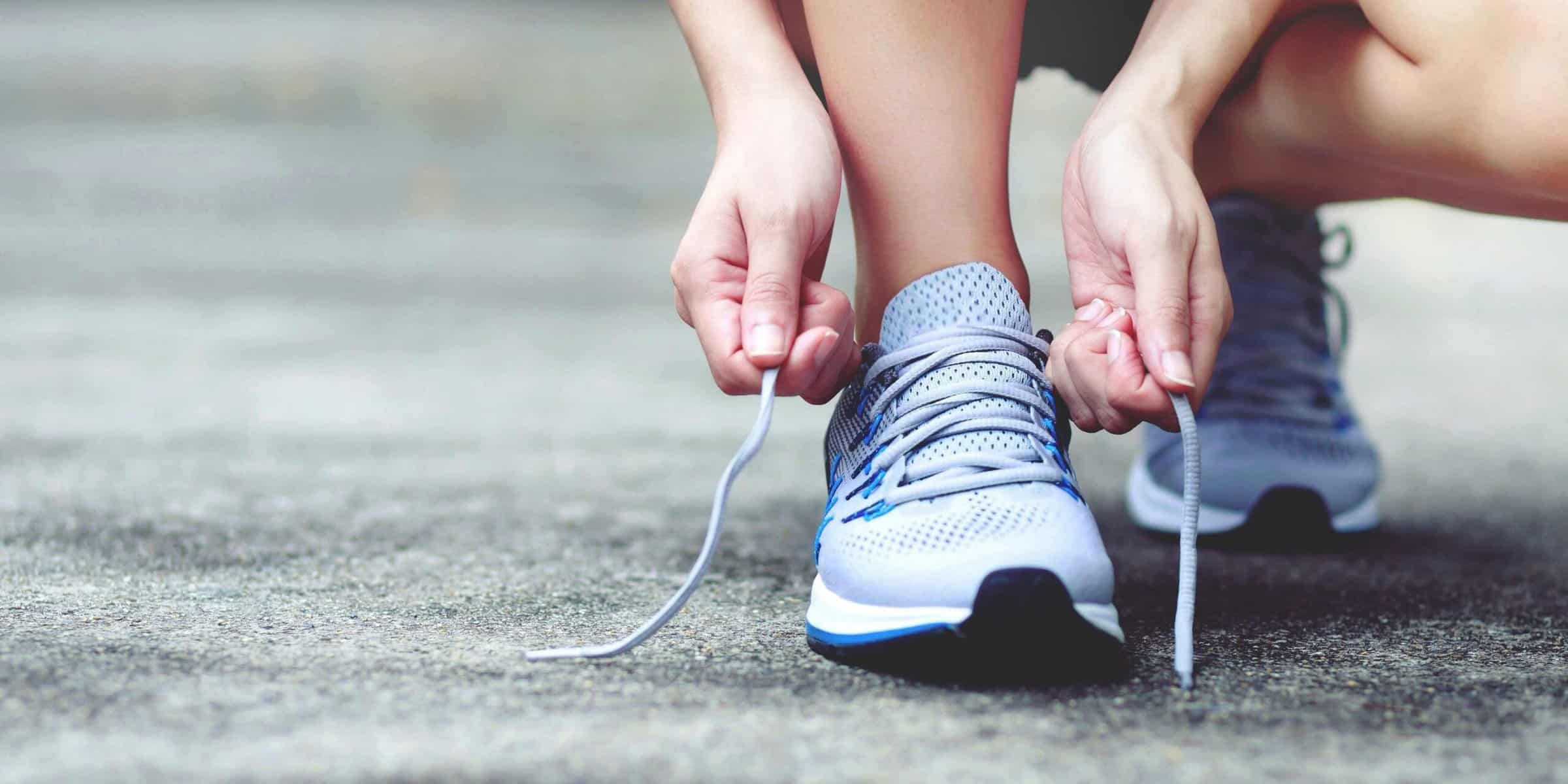You don’t need to buy a dishwasher rinse aid to get sparkly clean dishes and glasses. However, if you’re still worried about water spots on your dishes, you can try one of these natural DIY jet dry substitutes.
What does Jet Dry do? This from the Jet-Dry website was useful: “A rinse agent aids in the removal of residue that produces stains and film on dishes and glasses, left behind by commercial dishwasher detergent.”
What they are saying is that commercial detergents can leave residue behind which dries into the water drop stains we all hate to see. But purchasing rinse aids can be expensive and there are several alternatives.
Is it possible to make a frugal substitute for rinse aid at home? Well…yes it is and there are several ways.
What Can Be Used For Homemade Jet Dry?
The 3 best homemade Jet Dry substitutes are:
- Hydrogen peroxide
- Distilled White Vinegar
- Citric Acid

How To Make Homemade Dishwasher Rinse Aid
There are a few recipes for homemade jet dry, but they all typically use ingredients like vinegar, hydrogen peroxide, and water as the base.
You can also add other ingredients like essential oils or lemon juice to give your homemade jet dry a pleasant scent.
If you notice your glasses are not getting as clean as they should be, you may need to adjust the amount of homemade rinse aid you are using. With a little trial and error, you’ll be able to find the perfect recipe for your needs.
Here, I will give you the recipe for three different styles of homemade dishwasher rinse aids, so you can find one that works best for you!
1) Hydrogen Peroxide Dishwasher Rinsing Agent
Hydrogen peroxide is a non-toxic alternative to bleach. It is commonly used in homemade cleaning products as a whitener and disinfectant. Making this homemade dishwasher rinse aid is a great way to eliminate odors while leaving glasses (and dishwashers) sparkling.
For best results, add essential oils, such as orange oil, to hydrogen peroxide when using it as a rinse aid. Lemon juice itself is even a great natural cleaner and degreaser, making it a great choice for cleaning. Besides leaving your dishwasher smelling great, it won’t contain artificial fragrances.
In addition to orange and pine essential oils, Thieves essential oil is also an option. It contains several different scents into a lovely aromatic blend.
You Will Need:
- 1 Cup hydrogen peroxide
- 5-10 drops of essential oil
Instructions:
- Place five drops of essential oil into 1 cup of hydrogen peroxide.
- Mix well
- Pour carefully into the dishwasher’s rinse aid container.
- Refill the compartment as needed.
Afterward, you can admire your naturally spotless glassware and dishes after using your usual rinse cycle with this homemade jet-dry DIY rinse aid.
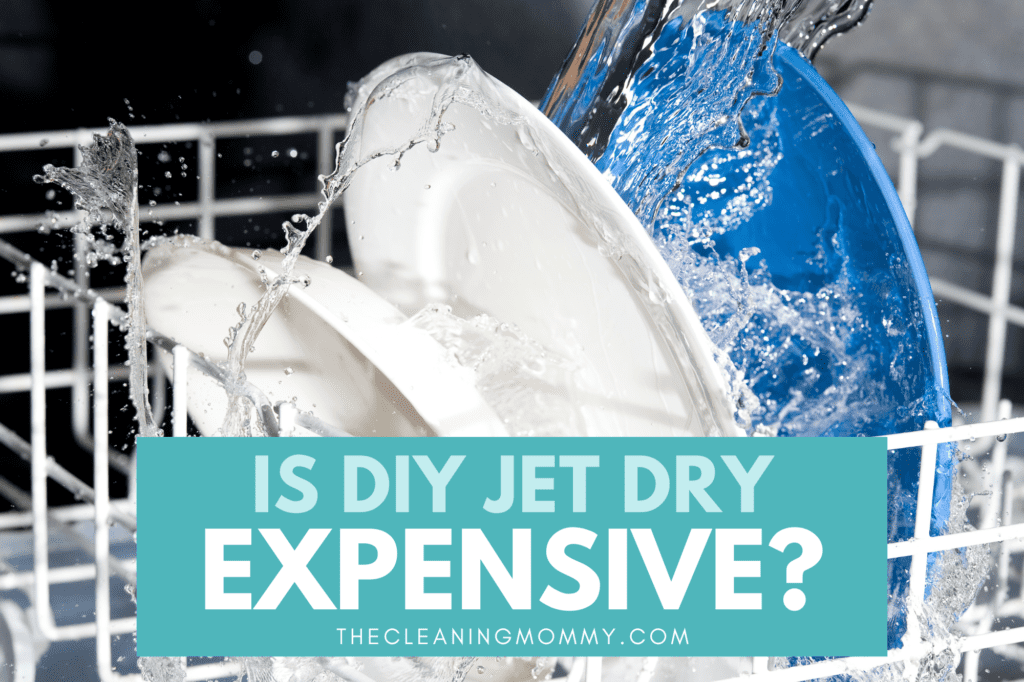
2) Recipe for Vinegar Dishwasher Rinse Agent
Household vinegar is an ideal DIY dishwashing rinse aid because it effectively removes residue from glassware while also cleaning your dishwasher naturally. It’s all done without the use of harmful chemicals.
The results of using white vinegar as a rinse aid in your dishwasher will amaze you, while there are some appliances in the home that vinegar shouldn’t be used for.
For best results, keep vinegar under 5% acetic acid, as more than 5% can corrode some dishwasher rubber parts. Check the label on your white vinegar to verify.
Using straight vinegar in the rinse aid dispenser, therefore is not a good idea. This mix will go directly into the dishwasher as opposed to the rinse aid port so that the rubber seal is not damaged.
You Will Need:
- 1/4 to 1/2 Cup distilled white vinegar
- Dishwasher safe bowl
- 5-10 drops of essential oil
Instructions:
- Place the bowl on the top rack of your dishwasher
- Pour in the white vinegar. Some testing and adjusting will tell you how much.
- Run the dishwasher as normal.
- Enjoy the fresh clean dishes.
3) Recipe for Citric Acid Dishwasher Rinse Aid
My preferred homemade dishwasher rinse aid is citrus acid, as it is non-toxic. As a result, hard water is broken down, pH levels are balanced, and soap in the dishwasher agent works more effectively.
It is a great disinfectant, descaler, and aids in the killing of mold, bacteria, and mildew, among other things.
You Will Need:
- 1 tablespoon citric acid
- 1/4 cup water (hot)
Instructions:
- Place citric acid into warm or hot water
- Mix well
- Pour carefully into the dishwasher’s rinse aid dispenser.
- Refill the compartment as needed.
There are crystals and liquid forms of this product available in most supermarkets. The dry citric acid can also be sprinkled in the bottom of the dishwasher before each load.
You should be aware that when used dry, citric acid can leave behind clumps. As a preventative measure, mix one tablespoon of citric acid with one and a half cups of boiling water in order to avoid this.
The result will be a liquid that will be easier to add to the rinse aid compartment, as well as minimizing the possibility of any residue being left behind.
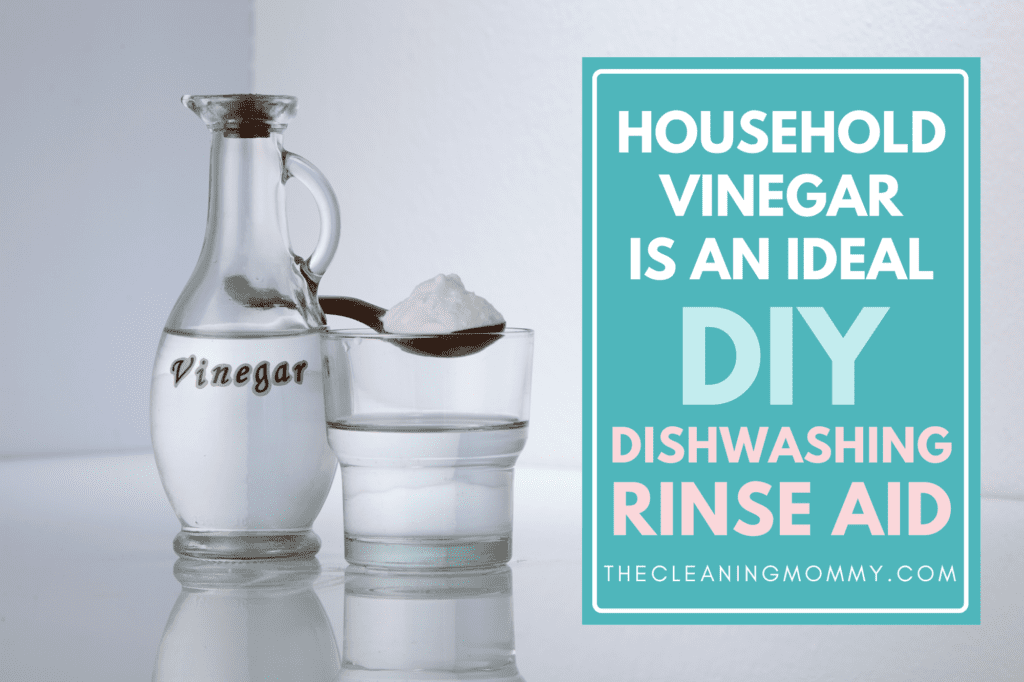
Jet Dry Helps Clean Dirty Dishes
When I needed a new dishwasher, I picked a high-quality machine, expecting to have sparkling-clean dishes as a consequence.
Instead, I found myself having to clean at least a quarter of the top rack after every load.
Washing dishes by hand after they’ve been through the dishwasher cycle is certainly inefficient, and it’s not what an already overburdened mom needs at the end of the day. Something had to give.
I contacted the dishwasher manufacturer, who gave me a couple of samples of dishwashing rinse aids and advised a certain (expensive) brand of detergent.
I was willing to test the detergent, but this thrifty mom was adamant about not spending any more money and introducing any more harmful chemicals into my house and the environment.
So I set out to learn how to produce an all-natural homemade dishwasher rinse aid.
These 3 recipes are the best DIY mixes I have found.
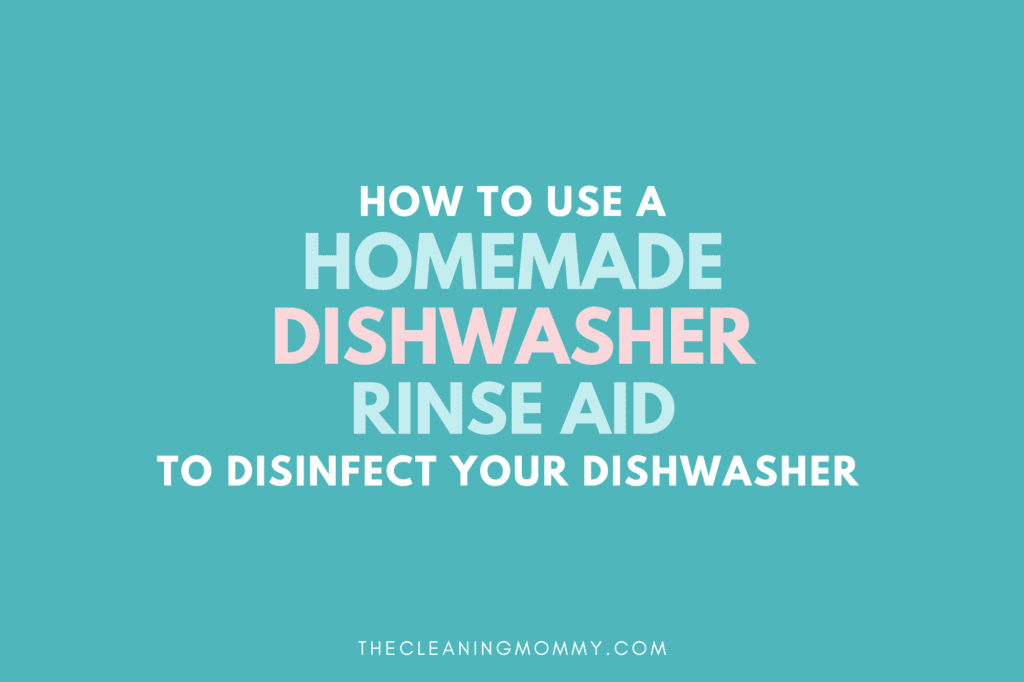
Why Make Your Own Natural Rinse Aid?
If you’ve ever looked at the ingredients list on a bottle of commercial jet dry, you may have been surprised by all of the unfamiliar chemicals it contains.
Many of these chemicals can be harmful to both people and the environment, which is why more and more people are looking for homemade, eco-friendly alternatives with no harsh chemicals.
Luckily, it’s actually quite easy to make your own homemade dishwasher rinse aid as an alternative to Jet Dry, and it’s much cheaper than buying the store-bought version.
Homemade jet dry is a great way to save money in the long run. The average bottle of jet dry lasts one to three months, which means buying a lot of it over the course of a year.
By making your own rinse aid, you can cut down on the number of bottles you need to purchase. As if you needed another reason to love saving money on commercial products.
Plus, homemade natural jet dry is just as effective as the store-bought variety.
How Much Does DIY Homemade Jet Dry Cost?
Peroxide, essential oils, and white vinegar are all cheap ingredients that can be used to make your own homemade jet dry. The expense of these ingredients pales in comparison to the cost of retail jet dry products.
These recipes are generally simple and only require a few ingredients that you probably already have in your home. Making your own jet dry is a great way to save cash and avoid exposure to harsh chemicals.
Each one costs pennies on the dollar when compared to commercial rinse aids like jet dry.
Can I Use Homemade Jet Dry in a Stainless Dishwasher?
Many dishwashers come with a rinse aid dispenser, and you may be wondering if you can use a DIY solution in place of a commercial product.
The good news is that white vinegar, citric acid, and even hydrogen peroxide are all safe for stainless steel dishwashers.
Simply fill the rinse aid dispenser with your chosen solution, and run the dishwasher as usual. You may need to experiment with different concentrations to find the perfect balance for your dishes.
With a little trial and error, you can easily find an economical way to keep your dishwasher running smoothly.
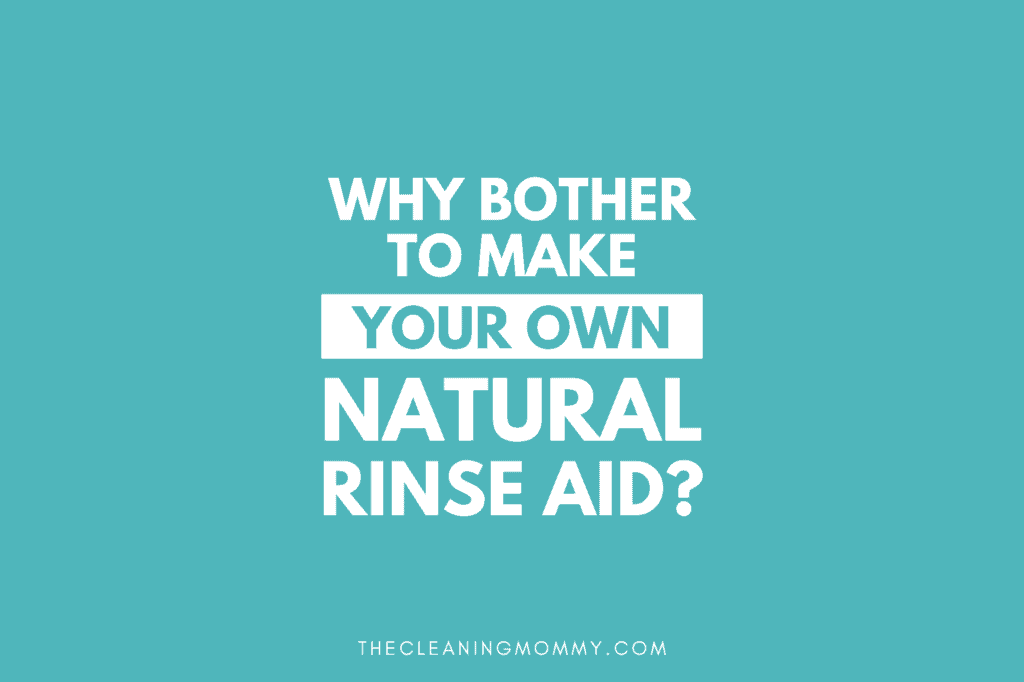
Which Essential Oils Should I Use?
There are many essential oils that are excellent for cleaning. These are some of my favorites that I would like to share with you.
- Lemon essential oil
Cleaning with lemon essential oil is great because it breaks up grease & grime. My homemade rinse aids contain lemon essential oil because it’s so great at cleaning.
Your kitchen will smell fresh and clean with lemon’s uplifting, invigorating scent.
- Sweet orange or wild orange essential oil
Orange oil can help remove grease and stuck-on food from dishwashers after repeated use, just like other citrus oils. The scent of orange is also happy, uplifting, and cheery. A fresh, clean smell of oranges fills your dishwasher when you open it.
- A blend of lime essential oils
Lime is great for deep cleaning dishwashers because it contains limonene, pinene, and terpinene. The fresh, tart scent of lime has another bonus – it purifies and cleanses the air in your kitchen as well as cleans your dishwasher.
When there’s a smell in the room, I spritz lime around it and it eliminates the odor. Lime is also great at refreshing the air, so I use it to make a homemade room deodorizing spray.
- Grapefruit oils
As a result of grapefruit’s antimicrobial properties, your dishwasher will be deep cleaned and disinfected. As an added bonus, it balances out the sour aroma of the white vinegar used in a white vinegar-based homemade rinse aid.
- Lavender essential oil
The calming properties of lavender are often what draw people to it, but lavender is also a fantastic cleaning agent. Because it’s antibacterial and anti-odor, it’s ideal for removing lingering food odors from your dishwasher.
All of these oils can be used with any rinse aid recipes you’ll find here for your homemade jet dry.
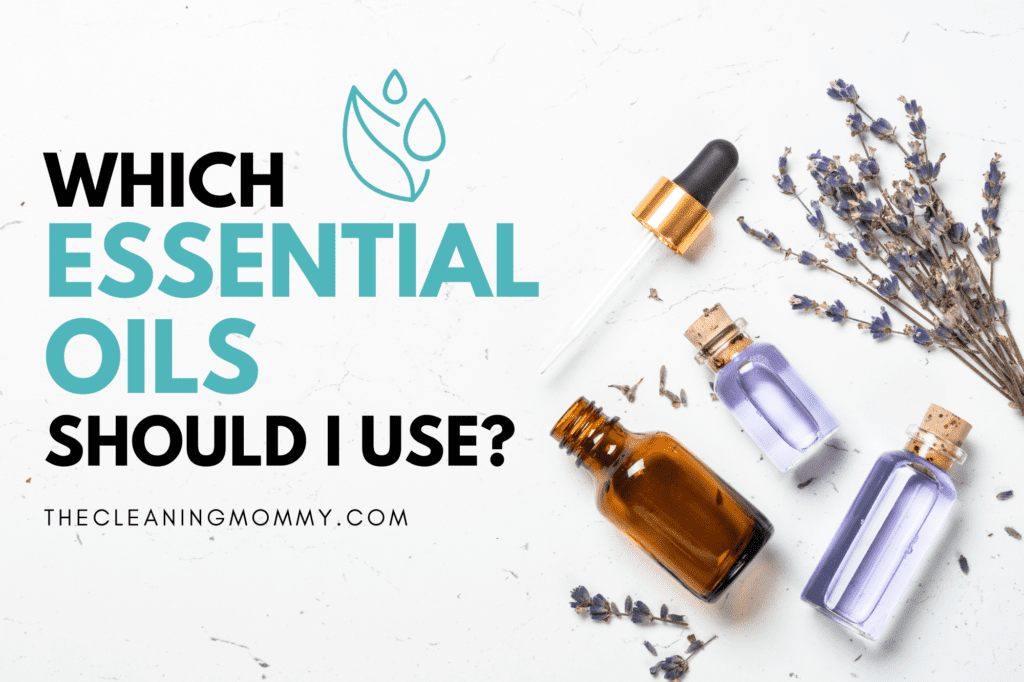
Can I Clean My Whole Kitchen With the Same Ingredients as Homemade Jet Dry?
Many people are surprised to learn that the same ingredients used in homemade jet dry can also be used to clean their whole kitchen.
Hydrogen peroxide, citric acid, and white vinegar are all powerful cleaning agents that can be used on a variety of surfaces.
For example, hydrogen peroxide is an excellent choice for cleaning countertops and cutting boards, as it can help to remove stains and bacteria.
Citric acid can be used to clean grout lines and tile, while white vinegar is ideal for cleaning glass and stainless steel.
In addition, all of these ingredients are safe for use around food, making them a great choice for cleaning kitchen surfaces.
So next time you need to deep clean your kitchen, reach for the hydrogen peroxide, citric acid, and white vinegar – you’ll be amazed at how well they work!
How to use vinegar for cleaning
Vinegar is a versatile household staple that can be used for cleaning, cooking, and more. When it comes to cleaning, vinegar can be used to clean surfaces, remove stains, and eliminate odors.
Vinegar is particularly effective at removing stubborn grease and grime.
To clean with vinegar, simply dilute it with water and use it in place of your regular cleaner. For tough jobs, you may need to use vinegar full-strength.
When using vinegar full-strength, be sure to take precautions such as ventilating the area and avoiding contact with skin and eyes.
Using peroxide for cleaning around the house
When it comes to cleaning supplies, there are a few household staples that everyone should have on their shopping list.
In addition to the basics like bleach, soap, and water, one of the most versatile and effective cleaning agents is hydrogen peroxide.
- To remove stains from clothing or upholstery, pour a small amount of hydrogen peroxide onto the stain and scrub with a brush or sponge.
- For tougher stains, you may need to let the peroxide sit for a few minutes before scrubbing.
- To cleanse and disinfect hard surfaces like countertops or doorknobs, mix equal parts hydrogen peroxide and water in a spray bottle and spray onto the surface. Wipe away with a clean cloth.

Can I Use Rubbing Alcohol As A Homemade Jet Dry?
Isopropyl alcohol, also known as rubbing alcohol, is an effective way to remove water spots and mineral deposits. It is a natural bactericidal treatment that helps keep bacteria at bay.
Isopropyl alcohol is also an organic solvent that can help remove dirt and grime.
When used on a wet surface, it can help to prevent the growth of mold and mildew. Additionally, it can help to break down oils and grease.
As a result, isopropyl alcohol is an incredibly versatile product that can be used for a variety of cleaning tasks.
Do’s and Don’t of Making Your Own Homemade Natural Jet Dry Rinse Aid
However, there are a few things you should know about other DIY rinse aids on the internet. Here’s why not all of them are safe.
Never Mix Peroxide and Vinegar
While peroxide and vinegar are both effective cleaning agents, you should never mix them together. When these two are combined, they create peracetic acid, which is a corrosive irritant.
In high concentrations, peracetic acid can harm the skin, eyes, throat, nose, and lungs. And, possibly your dishwasher, costing you more money.
If you must use both peroxide and vinegar as part of your rinse agent for homemade natural jet dry, make sure to use them in succession, not simultaneously.
By following this simple rule, you can avoid exposure to harmful chemicals and keep your home clean and safe, while still using a natural rinse aid recipe.
How Do I Store Extra DIY Rinse Aid Solution?
Diy rinse aid solutions can be tricky to store. If you use peroxide in your recipe, it’s important to not mix it with vinegar. The two ingredients will cancel each other out and render the solution useless.
Instead, store the peroxide in a separate container and mix it with the vinegar just before using it. This will help to keep the solution fresh and effective.
You can also extend the shelf life of your citric acid-based rinse aid by storing it in a cool, dark place. This will help to prevent the peroxide from breaking down and becoming ineffective.
By following these tips, you can ensure that your homemade rinse aid solution stays fresh and effective for as long as possible.

Frequently Asked Questions
Do I need to use rinse aids in the dishwasher?
There are a few reasons you might want to consider using a dishwasher rinse aid. Hard water can leave spots on your glassess, and a rinse aid can help prevent that.
If you notice that your detergent often leaves behind a film, a rinse aid can also help with that.
A dishwasher rinse aid can also help keep your dishwasher clean by preventing soap scum build-up. Ultimately, whether or not you use a rinse aid is up to you and your personal preference.
If you have hard water or notice that your dishwasher detergent often leaves behind a film, then using a rinse aid might be a good option for you if you want sparkling dishes, or at least cleaner dishes.
Can I Wash Dishes With Only Rinse Aids?
When it comes to actually getting your dishes clean, you need more than just rinse aid. Rinse aids are designed to prevent hard water spots and help drying, but they don’t actually clean dishes.
This means that if you rely on rinse aid alone, your dishes won’t be as clean as they could be. To banish germy food particles, you need to use a dishwashing detergent as well.
Dishwashing detergents are specifically designed to clean dishes, so using one in conjunction with rinse aid will give you the best possible results.
If you’re looking for clean, spotless dishes, make sure to use both a dishwashing detergent and a DIY recipe for a rinse aid.
What happens if I touch citric acid?
Citric acid is a natural acidic compound that is found in many fruits and vegetables. It can also be produced synthetically for use in a variety of industrial and household products.
Although citric acid is safe for most people, it can cause skin irritation in those who are sensitive to it. The acidic nature of citric acid can cause itchy skin and even burns if it comes into contact with bare skin.
To avoid any accidental contact, hands should be washed immediately after handling citric acid, and protective gloves should be worn during use.
For those who are sensitive to citric acid, it is important to take precautions to avoid any potential skin reactions.
Conclusion
Homemade jet dry is now within reach by using one of these dishwasher rinse aid recipes! If you want a natural option for your old or even new dishwasher, save the stress of dealing with filmy dishes.
Try one of my homemade jet dry dishwasher rinse aid recipes and see for yourself how with a little hot soapy water, your dishes are cleaner than ever!
You won’t spend as much money on a dishwasher rinse aid that doesn’t work, and save time having to wash dishes again and again. Washing dishes by hand is NOT what you want to be doing.
The truth is, your dishwasher rinse aid plays a vital role in the cleaning process. By reducing the surface tension of water, it helps to prevent water droplets from beading up on your dishes.
Best of all, you can easily make your own dishwasher rinse aid at home with just a few simple ingredients. For the thrifty couple of people who want real results, a natural dishwasher rinse aid recipe is the trick!
More DIY Cleaners
- Homemade Alcohol-Free Eyeglass Cleaner
- The Ultimate Guide To Cleaning With Vinegar
- DIY Cleaning Slime
- Get clutter free countertops in your kitchen by doing this!
- Cleaning up fire extinguisher residue
- How to make your own homemade eyeglass cleaning solution

Grainne Foley
Grainne Foley is a wife and mother of 2 great kids. During her 5 years of full time RV travel, Grainne learned to become very efficient at household chores, in order to make time for family adventures. Now, back in a house, she has continued to create tools and techniques to help others lighten the load of household organization and cleaning.
